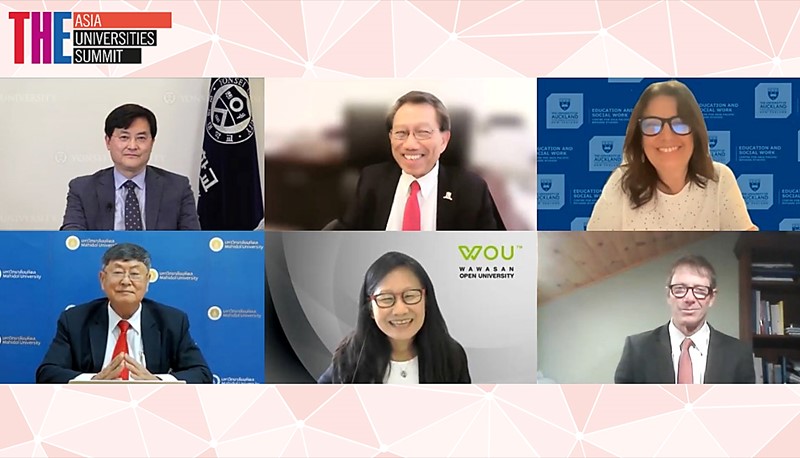
Vice-Chancellor predicts ‘reverse brain drain’ in Asia

Prof. Rocky S. Tuan (top middle) sees a ‘push-and-pull’ effect which may produce a ‘reverse brain drain’ in Asia.
Vice-Chancellor Prof. Rocky S. Tuan spoke at a panel titled ‘How are Asian Universities Responding to the Challenge of Demographic Change?’ at the virtual Times Higher Education (THE) Asia Universities Summit on 3 June. He noted that the demographic changes in the region will undoubtedly impact the talent pool. He also suggested that an interplay of the COVID-19 pandemic, geopolitics, anti-Asian racism, and government-driven innovation policy may lead to a ‘reverse brain drain’ in Asia.
Given the demographic diversity of the Asian region, there has been a need to redistribute educational resources in order to meet the specific demands in each of the places. The panel discussed the demographic changes as well as challenges in recent years, in particular the COVID-19 pandemic, and how they have affected higher education in the region, specifically on whether they will promote regional mobility and circulation of talents. In addition to Prof. Tuan, the panel comprised President Banchong Mahaisavariya of Mahidol University, President Seoung Hwan Suh of Yonsei University, Vice-Chancellor Lily Chan of Wawasan Open University, and Co-director of the Centre for Asia Pacific Refugee Studies Prof. Gül İnanç of the University of Auckland.
Prof. Tuan remarked that, as a result of the pandemic, geopolitics and anti-Asian sentiment, the longstanding and traditional trend of Chinese and other Asians pursuing education in the West has experienced a dramatic downturn and is likely to continue for a while. Closer to home, the substantial funding injected into innovation and technology by China has produced a ‘push-and-pull effect’ which will encourage the talent pool to stay in Asia, leading to a ‘reverse brain drain’ in the region. He believes the Greater Bay Area of south China, for example, will be ‘an interesting magnet to attract many of the talents that would otherwise have gone off to North America and Europe.’
As the world witnesses a fall in birth rate and longer lifespan, Prof. Tuan also sees opportunities for using virtual platforms, which are gaining popularity and acceptance these days, for training. Virtual platforms allow those outside of the conventional university age to upgrade or change their skill sets to pursue multiple careers at any stage of their lives, despite family or work commitments, for example.
CUHK ascended one place from 8th to 7th in the THE Asia University Rankings 2021 released during the summit.